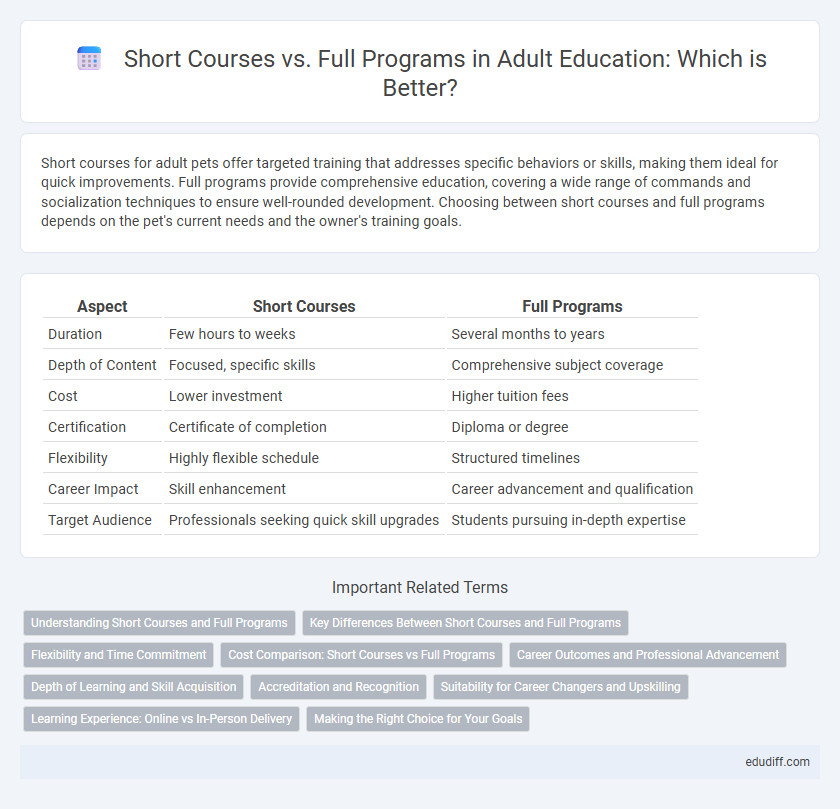Short courses for adult pets offer targeted training that addresses specific behaviors or skills, making them ideal for quick improvements. Full programs provide comprehensive education, covering a wide range of commands and socialization techniques to ensure well-rounded development. Choosing between short courses and full programs depends on the pet's current needs and the owner's training goals.
Table of Comparison
| Aspect | Short Courses | Full Programs |
|---|---|---|
| Duration | Few hours to weeks | Several months to years |
| Depth of Content | Focused, specific skills | Comprehensive subject coverage |
| Cost | Lower investment | Higher tuition fees |
| Certification | Certificate of completion | Diploma or degree |
| Flexibility | Highly flexible schedule | Structured timelines |
| Career Impact | Skill enhancement | Career advancement and qualification |
| Target Audience | Professionals seeking quick skill upgrades | Students pursuing in-depth expertise |
Understanding Short Courses and Full Programs
Short courses offer targeted knowledge and skills in a condensed timeframe, ideal for professionals seeking quick upskilling or specific expertise. Full programs provide comprehensive education with in-depth coverage of a subject, often culminating in a formal qualification such as a diploma or degree. Choosing between short courses and full programs depends on career goals, time availability, and the level of mastery required.
Key Differences Between Short Courses and Full Programs
Short courses typically focus on specific skills or knowledge areas, offering concise, targeted learning often completed within weeks, whereas full programs provide comprehensive education covering broader subject matter over several months or years. Full programs usually include structured curricula, assessments, and qualifications that carry more weight in professional or academic settings compared to the certificate of completion from short courses. Employers often value full programs for in-depth expertise, while short courses are preferred for quick upskilling or continuous professional development.
Flexibility and Time Commitment
Short courses offer unmatched flexibility with condensed schedules that accommodate busy adult learners seeking skill acquisition without long-term commitment. Full programs demand significant time investment, often extending over months or years, making them less adaptable for adults balancing work and personal life. Prioritizing short courses enables faster completion and immediate application of skills, ideal for career advancement or exploration with minimal disruption.
Cost Comparison: Short Courses vs Full Programs
Short courses typically offer a lower upfront cost compared to full programs, making them an affordable option for adults seeking skill enhancement without significant financial commitment. Full programs often require higher tuition fees but provide comprehensive learning, potentially leading to better job prospects and higher long-term earning potential. Evaluating the cost per credit hour and return on investment helps adults determine the most economical choice for their education goals.
Career Outcomes and Professional Advancement
Short courses offer targeted skill development ideal for rapid career shifts or immediate job market needs, enhancing specific competencies with flexibility. Full programs provide comprehensive education and deeper knowledge, leading to stronger qualifications and higher professional credibility in competitive industries. Career outcomes from full programs often include better long-term advancement opportunities and access to leadership roles.
Depth of Learning and Skill Acquisition
Short courses offer targeted skill acquisition with focused content, ideal for quick upskilling in specific areas. Full programs provide comprehensive depth of learning, integrating theory and practice to build advanced expertise and critical thinking. Adults seeking mastery and long-term career growth benefit more from the extensive curriculum and in-depth knowledge provided by full programs.
Accreditation and Recognition
Accreditation and recognition significantly impact the value of short courses versus full programs, as full programs typically hold more comprehensive accreditation from established educational authorities, enhancing their credibility and transferability. Short courses often provide targeted skills with less formal accreditation, appealing for quick upskilling but may lack wide recognition in professional or academic settings. Employers and institutions generally prioritize full programs with rigorous accreditation to ensure validated learning outcomes and standardized qualifications.
Suitability for Career Changers and Upskilling
Short courses offer targeted skill development ideal for career changers seeking rapid entry into new fields or specific upskilling needs, enabling flexible learning schedules that accommodate work commitments. Full programs provide comprehensive knowledge and credentials valuable for in-depth mastery and long-term career advancement, often favored by those aiming for significant role transitions or specialized expertise. Both options cater to different career goals, with short courses emphasizing speed and adaptability, while full programs emphasize depth and formal qualifications.
Learning Experience: Online vs In-Person Delivery
Short courses often provide a focused and flexible learning experience, ideal for adults balancing work and personal commitments, with online delivery offering asynchronous access to materials and interactive digital tools that enhance engagement. Full programs typically involve comprehensive curricula delivered over a longer duration, with in-person classes fostering direct interaction, hands-on activities, and immediate feedback that can deepen understanding. The choice between online short courses and in-person full programs impacts skill acquisition speed, networking opportunities, and adaptability to learners' schedules.
Making the Right Choice for Your Goals
Short courses offer targeted skill development and flexibility, ideal for professionals seeking quick upskilling or career shifts without long-term commitment. Full programs provide comprehensive knowledge and in-depth expertise, best suited for individuals aiming for advanced credentials or career advancement in specialized fields. Aligning course type with career objectives, time availability, and learning style ensures effective investment in education.
Short courses vs Full programs Infographic

 edudiff.com
edudiff.com